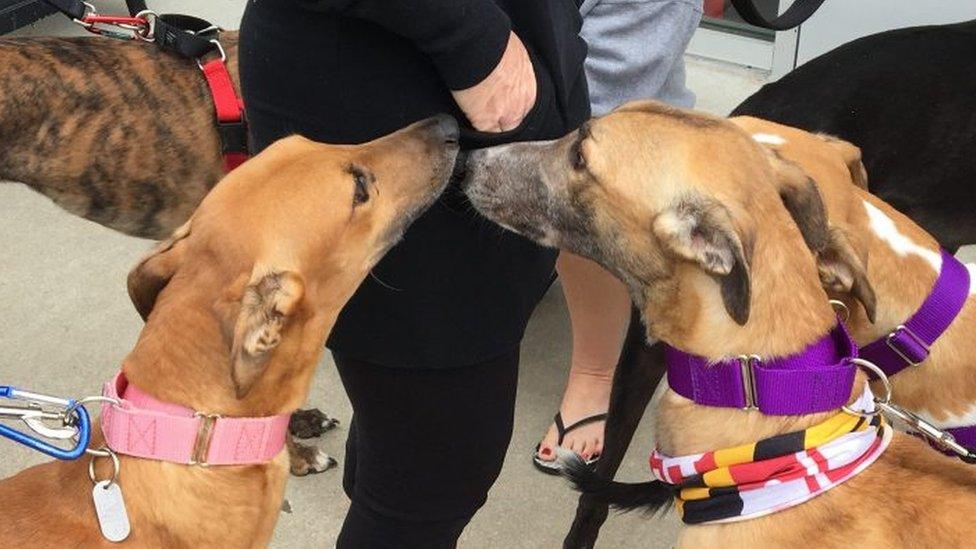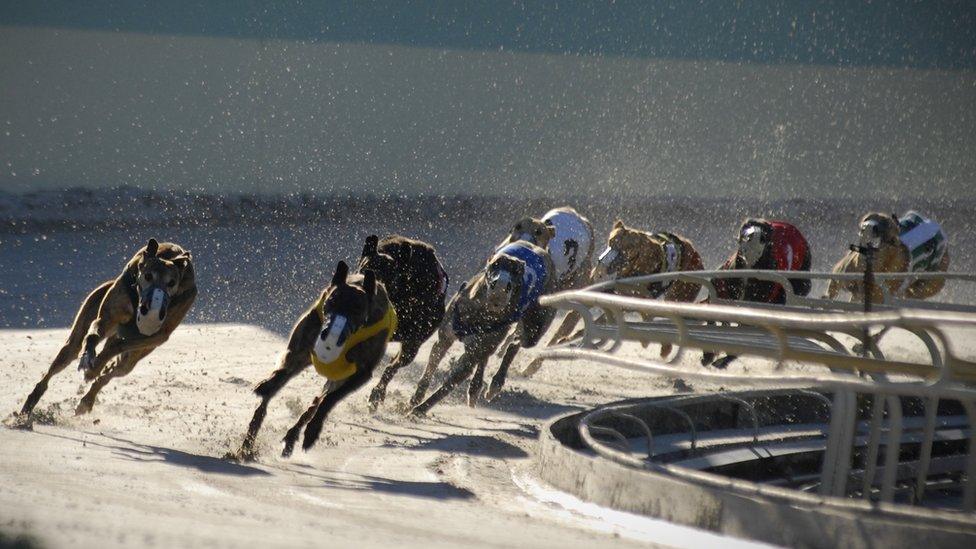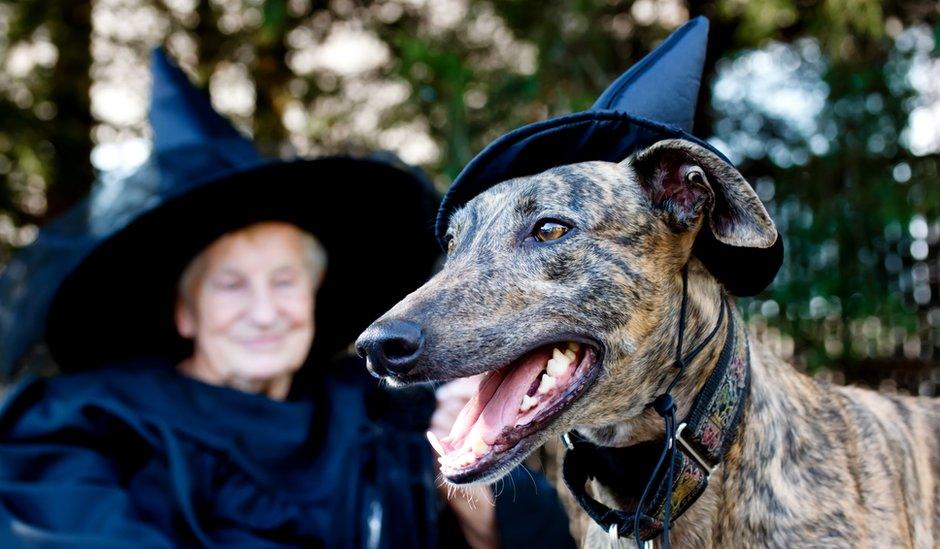Has a new racing ban in Florida doomed these dogs?
- Published

Organisations that re-home greyhounds warn a racing ban will have unintended consequences
Sometimes trying to making things better actually makes them worse.
When an amendment passed on 6 November to ban dog-racing in Florida, animal-lovers and rights activists celebrated.
But greyhound adoption groups have told the BBC they now fear the ban could lead to thousands of dogs being killed as it comes into force.
Animal rights groups fiercely contest the claim, calling it "fear-mongering" by groups close to the racing industry.
Carol Becker, a musician who volunteers as president of Florida-based greyhound adoption group God's Greyts, supports greyhound racing.
She says the dogs, whose dual love of running and sleeping earns them the nickname "speeding couch potatoes", are made for the sport.
Once they retire from their life of chasing mechanical rabbits around a race course, 98% of Florida greyhounds go on to lead happy lives with adopted families, she claims.
But now the racetracks are closing, too many dogs coupled with too few adoptions could lead to trainers euthanising the animals when their upkeep becomes unaffordable, Mrs Becker suggests.
Florida has voted to ban greyhound racing and close 11 tracks
Florida's 11 race tracks must close by 2021, after Amendment 13 passed with 69% of the vote following a campaign led by greyhound protection non-profit Grey2K USA.
Those dogs who don't continue their careers in America's remaining six tracks will need to be found homes.
"It's a historical moment for Florida. I'm so excited about this change and happy that dogs will now be allowed to just be dogs," Christine Dorchak, President of Grey2K and author of the amendment ballot, told the BBC.
Greyhound racing remains legal in eight countries and in the UK, 29 greyhound race tracks are still operational.
Mrs Dorchak dismisses warnings by adoption organisations, claiming that pro-industry groups use "scare tactics" every time tracks close.
Animal rights activists have long maintained the sport is cruel and can cause devastating injuries.
Greyhounds usually begin their career at around 15 months old and retire aged three when adoption agencies try to find them homes.
Protect Dogs Yes on 13, who campaigned for the ban, published claims on their website, external that racing dogs are "kept in cages for up to 23 hours a day" and that a greyhound dies at a Florida track every three days on average.
According to a report by The American Society for the Prevention of Cruelty to Animals, external, who support racing bans, dogs are routinely fed meat from diseased animals and 16 cases have been documented of greyhounds testing positive for cocaine.
But claims of abuse in Florida racetracks are dismissed as misleading by adoption groups, the National Greyhound Association and The Committee to Support Greyhounds, which opposed Amendment 13.
Mrs Becker, of God's Greyts, says that in 16 years of visiting tracks, she has never seen dogs abused or unhappy.

Eleven of America's 17 dog racing tracks are in Florida
"I visit kennels two to three times a week without restriction. I know first-hand how racing greyhounds eat, breathe and live.
"They are there to run competitively, [so] why would a trainer mistreat them? They eat better than what I feed my dogs, because I can't afford the expensive food they get. They live in spacious crates."
She says the challenge of re-housing greyhounds is huge because supply will outstrip demand.
Estimates of the number of racing greyhounds in Florida range from 3,700 by anti-racing Grey2K to more than 8,000 by the pro-racing Florida Greyhound Association.

The decline of greyhound racing around the world
The 600 greyhounds in Macau that have been left behind

Mrs Becker's organisation has found new homes for just 1,600 dogs since 2007 and says the number of dogs in Florida is overwhelming.
"We are working at capacity, taking as many dogs as we can afford to feed and move around. I don't see how we can increase that," Mrs Becker says, adding that it costs $100-$200 (£77-£154) a month to keep a greyhound, depending on the quality of food and size of vet bills.
Most racing dogs are owned by individuals who live out of state and hire trainers to care for and race the greyhounds.
Mrs Becker says most dogs will be left with their trainers, who will be looking for new jobs and will be unable to afford the dogs' upkeep.

Greyhounds speed and laziness earned them the name "fastest couch potatoes"
In Washington DC, another adoption group Greyhound Welfare, agrees there are significant difficulties ahead.
"We've been taking dogs from Florida since 2002, but are limited by the number of people willing to house them. They are wonderful pets to adopt, but it's going to be a tremendous amount of work," says the group's volunteer president Barbara Hansen.
However, Grey2K point to five cases of large track closures in Massachusetts, New Hampshire, Rhode Island, Arizona and Connecticut when the "overwhelming majority" of dogs were found new homes or safely returned to their owners.
"We are confident that the dogs will be re-homed, and the end of dog racing permanently is a happy, far-reaching result for this breed," Ms Dorchak concedes.
Small steps have already been taken in Florida to find the dogs new homes.
Rescue+Freedom Project, a national group that finds homes for rescue dogs, put out a call on Facebook for new owners and has so far received around 15 expressions of interest.
The organisation's vice-president April Arrington says that although some dogs may end up being euthanised, it's important to "think about the future generations of dogs who, thanks to this ballot, will no longer live in caged exploitation".